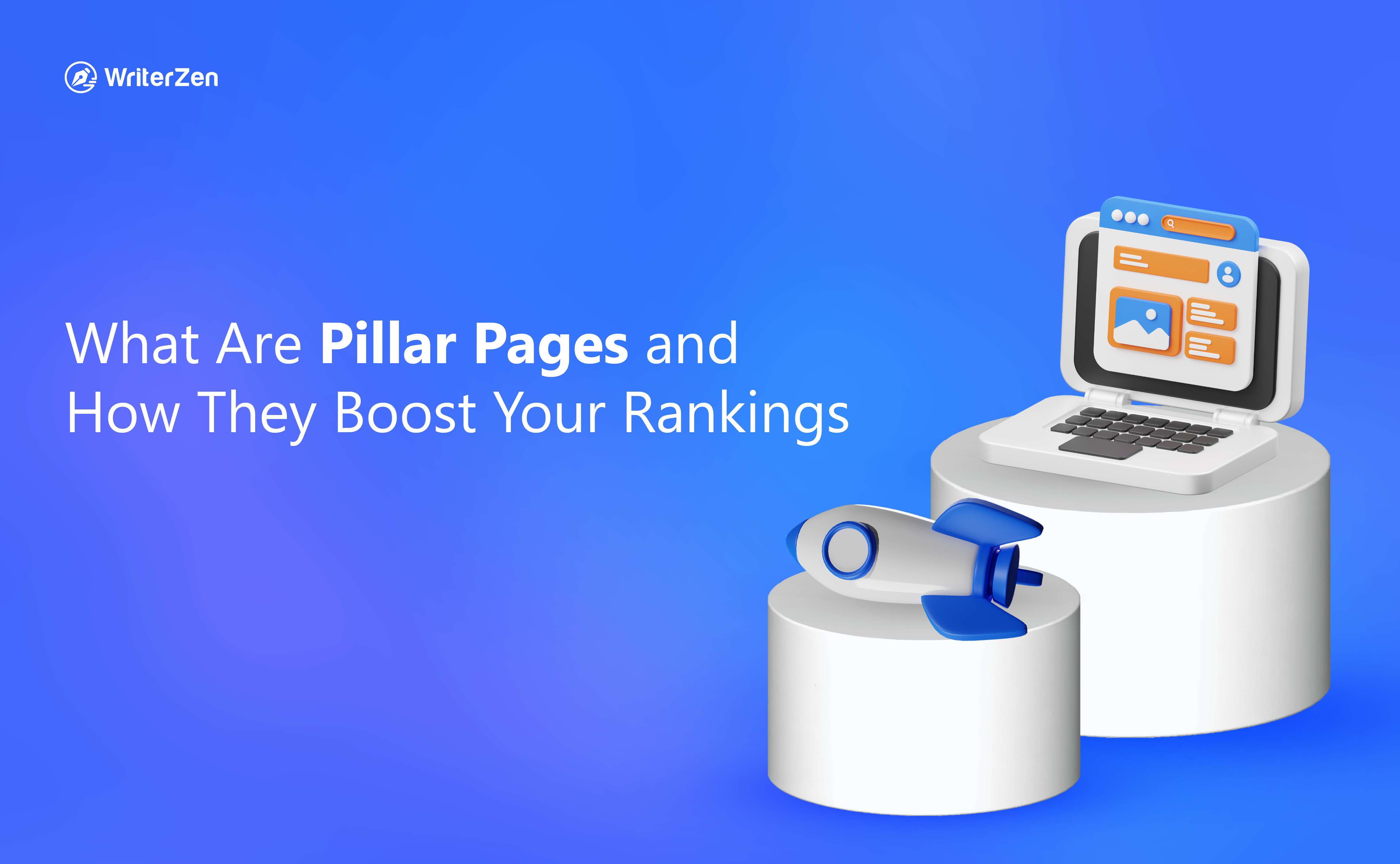Pillar pages are an effective way to boost your website's rankings and visibility. They provide a comprehensive overview of a specific topic and are an essential part of any successful SEO strategy.
In this article, we will explore what pillar pages are, how they can benefit your website, and how to create a pillar content strategy.
What Is a Pillar Page
A pillar page is an in-depth, comprehensive page of content that covers a specific topic in detail. It serves as a hub for related content, providing an overview of the topic and then linking to other related content.
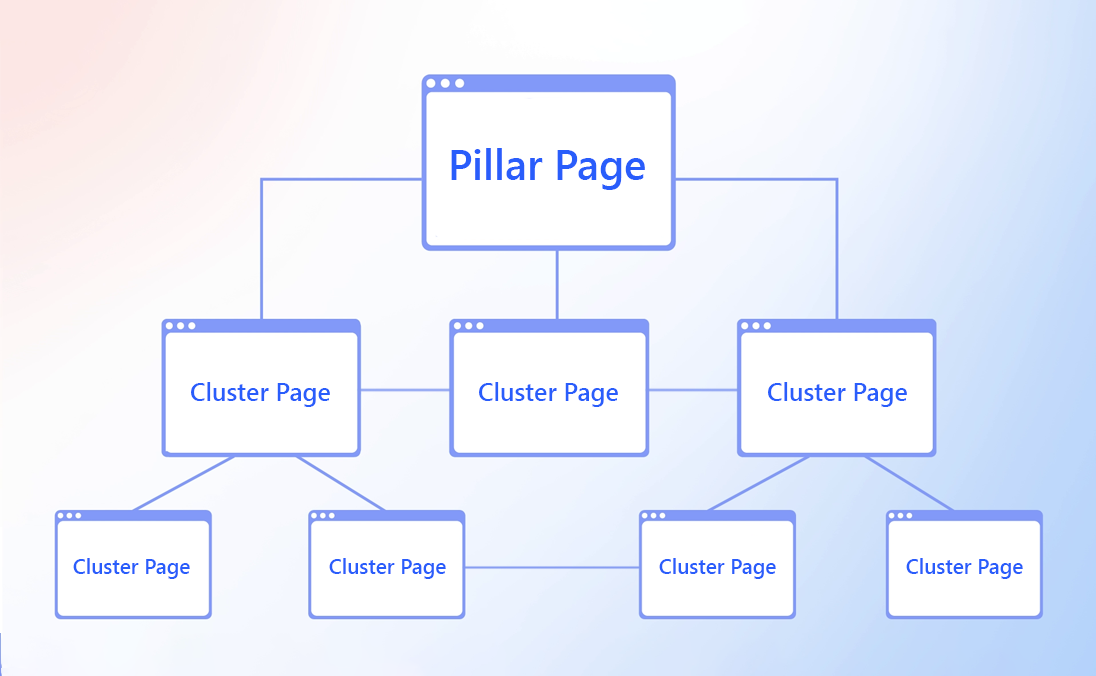
By creating pillar pages, you can ensure that your content is organized in a way that is easy for readers to find and understand. This helps to create a more comprehensive and engaging experience for the reader, as they can easily access the information they need without having to search through multiple pages.
Additionally, pillar pages can be used to optimize your content for search engines, as they provide a clear structure for search engine crawlers to index your content.
Topic Clusters and Pillar Pages
In addition to pillar pages, we have the term “topic cluster.”
Topic clusters are groups of content focusing on a specific topic; they are organized sections of information relating to the main topic.
The pillar page acts as the starting point of the topic cluster, providing an overview of the main topic and linking to the topic cluster content. The topic cluster content, in turn, links back to the pillar page, creating a web of interconnected content that helps search engines to better understand the topic and rank it higher in search engine results pages (SERPs).
This is especially important for long-tail keywords, as it provides a more comprehensive view of the topic. By utilizing pillar pages and topic clusters, you can help your website rank higher and provide a better user experience.
Benefits of Utilizing a Pillar Page
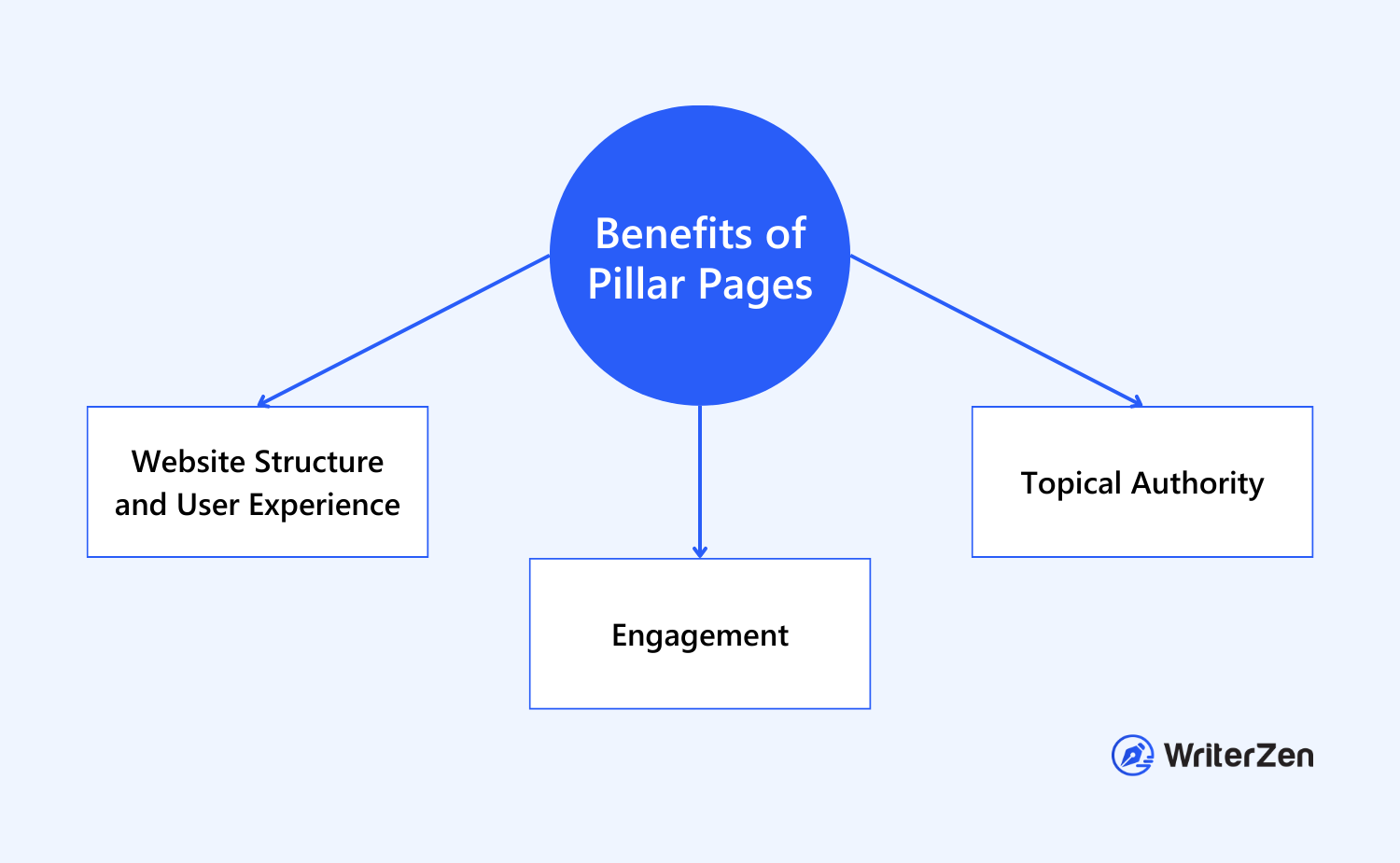
Improves Website Structure and User Experience
By categorizing and grouping related content together, your website experience becomes more organized and easier to navigate. This allows visitors to quickly get an idea of what your site is about and effortlessly find the information they are looking for.
Additionally, this structure helps search engines understand the hierarchy of your website, making it easier for them to index and rank your pages.
Boosts Engagement
Utilizing pillar pages can significantly improve your website's bounce rate, keeping visitors on your website for longer periods of time.
By providing users with a single location to find everything they need on a specific topic, they are less likely to navigate away from your site and instead spend more time exploring the information you have to offer.
This will not only increase their dwell time, but they will also become more familiar with your brand and are more likely to choose you over other competitors.
Establish Topical Authority
Topical authority is when your website is recognized as an expert or thought leader on a particular topic or niche. To achieve this, your website needs to have a large amount of high-quality, comprehensive, and relevant content, as well as be viewed as an authoritative and trustworthy source by both users and search engines.
Pillar pages are an excellent way to showcase your website's expertise and knowledge on a particular topic or niche.
The more focused and relevant your content is, the more likely search engines will recognize your website as an authority on that topic and rank your pages higher in search results.
Types of Pillar Pages
The types of pillar pages should be chosen depending on their content and aims. Below are the three most commonly used pillar pages:
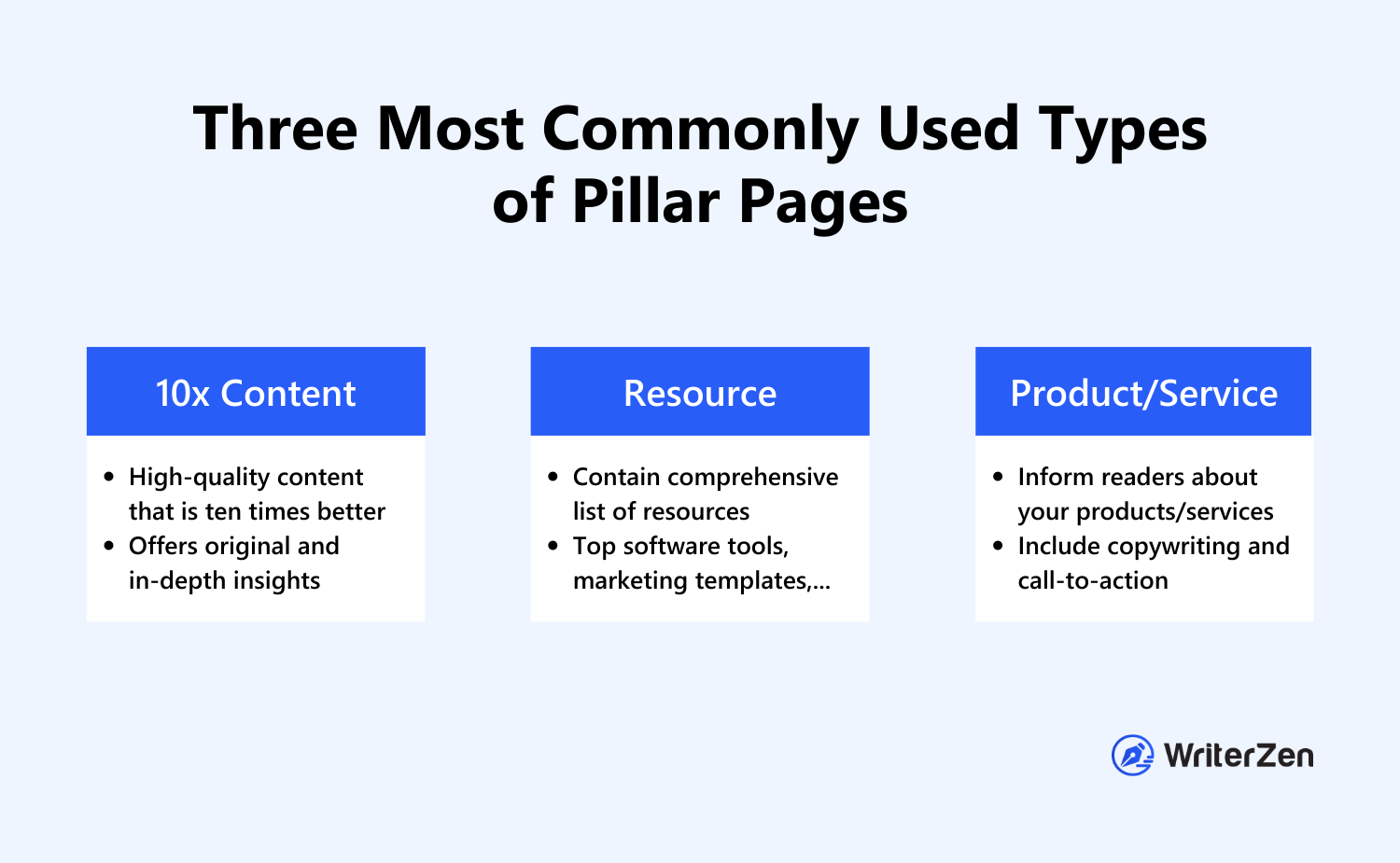
10x Content Pillar Page
The term "10x content" was coined by Rand Fishkin, the co-founder of Moz, to describe high-quality content that is ten times better than anything else out there.
So, a 10x content pillar page is a comprehensive piece of content that is so useful or valuable that it stands out from other content on the same topic. In other words, it is content that provides extraordinary value to the reader and establishes your website as an authoritative source on the subject.
This type of pillar content covers a specific topic in-depth and serves as a guide, offering original insights or ideas and offering innovative ideas or solutions to common problems. It may contain multimedia content such as videos, infographics, and images that help to visually illustrate concepts and engage users in different ways.
10x content pillar pages should be designed with the user experience in mind, providing comprehensive resources such as checklists, templates, or guides. These additional resources are intended to make the page more valuable and user-friendly, ultimately increasing the chances of the user bookmarking, referencing, or sharing the content.
Resource Pillar Page
Resource pillar pages are web pages that contain a comprehensive list of resources related to a specific topic. They offer users a valuable and curated collection of tools or resources that can help answer questions or solve problems they may have.
In contrast with 10x content, which focuses on providing value to the reader by offering original, in-depth insights or ideas on a particular topic, a resource pillar page provides a comprehensive list of resources related to a specific topic without necessarily providing original insights. The objective is to provide a “one-stop-shop” for users interested in acquiring knowledge of a particular subject.
These pages can be highly effective in generating backlinks from other websites, increasing your website’s search engine rankings, or boosting your website’s authority on the topic, especially as users find them highly shareable on social media.
Product/ Service Pillar Page
While a product or service pillar page may not be the most popular choice of pillar pages, however, it is a good option for business websites that are selling products or services. This is especially the case if your business website is used to sell a wide range of products or services.
The pillar pages aim to inform readers about the products and services offered on the website. This type of pillar page does not include information that goes too in-depth but rather gives a simple overview of the product and services.
The SEO techniques often implemented in the website strategy using a product or service pillar page might include copywriting and call-to-action.
How to Build a Pillar Content Strategy
When developing a pillar SEO content strategy, it is important to make sure that you include all the steps, which will also increase your chance of having a successful campaign that will boost your website. Establish a pillar content strategy by completing the following steps:
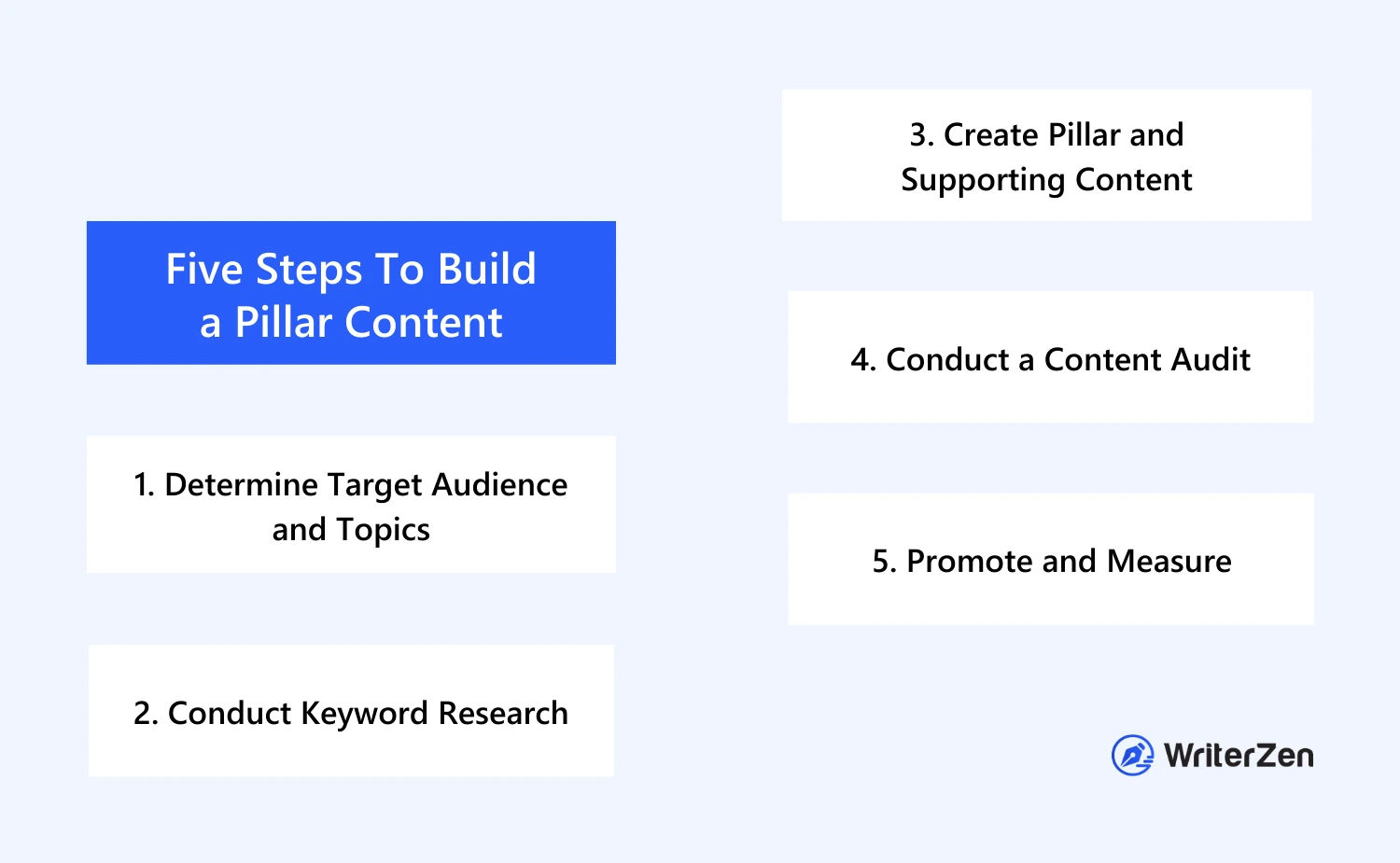
Determine Target Audience and Topics
Your first task should be to clearly define your target audience. Who are they? What are their pain points? What challenges do they face? Having a clear understanding of your audience will help you tailor your content to their needs.
Once you have a clear understanding of your target audience, identify topics that are relevant to them. Think about potential questions your audience may have or the types of content they may be searching for online.
When selecting a topic, it is also important to choose something that you are familiar with and has broad themes. This will make the writing process much easier because you will have a bit of background knowledge on the topic.
Conduct Keyword Research
The next step is conducting keyword research. After completing keyword research, you will better understand which keywords you should mention on the pillar page and the ones you should avoid using.
Use keyword research tools, like WriterZen, to identify keywords related to your pillar topics. This will help you optimize your content for search engines and increase the visibility of your content.
Create Pillar and Supporting Content
Once you have identified your pillar topics and relevant subtopics, begin to create your pillar content. This might include creating an in-depth article or whitepaper, a comprehensive guide or checklist, or even a video or podcast series covering the topic.
After that, create supporting content. This may include blog posts, videos, or social media posts that link back to your pillar content or even a resource page that lists or curates related content, both on and off your website.
Conduct a Content Audit
A content audit is essential for any page that has been around for quite some time. Before you implement a pillar content strategy on your website, conducting a content audit is a good idea.
This process includes going over all the content that already exists on the sight and identifying its strengths and weaknesses. Once a content audit is complete, you will better understand which content you should keep on your page, what you should remove, and what you can link to the new pillar page.
Promote and Measure
The final step of developing a pillar content strategy is to implement this strategy on your website. To ensure your pillar content reaches your intended audience, promote it through various channels such as email, social media, and other marketing channels.
Then, track your success through metrics such as website traffic, backlinks, and social shares, and adjust your strategy accordingly.
Tips for Building Pillar Pages
Now that you know how to develop a pillar page, you can get started on your website. However, before you develop a pillar page, there are a few important tips that you should keep in mind:
-
View pillar page examples: During the pillar content strategy development stage, browsing through pillar page examples is a good idea. After seeing a few examples, you will better understand what you may want to do with your pillar page.
-
Conduct research on competitors: Another important step to be done before implementing the pillar page is to research your competitors. This is especially the case if your competitors have a pillar page that discusses the same topic. After conducting this research, you can start thinking about how to improve your pillar page.
-
Follow all steps listed in building a pillar content strategy: Once you have developed your pillar content strategy, it can be a good idea to go over the strategy and make sure that you have not left out any key steps.
Final Thoughts
In conclusion, having a well-planned pillar page strategy as part of your overall SEO plan can provide significant results for your business in terms of increased visibility and organic traffic, making it a valuable investment for any website owner.
So, implement the steps we have outlined and see the results yourself!


